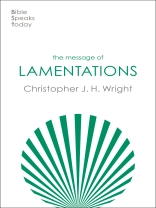The destruction of Jerusalem by the Babylonians in 587 BC is the likely setting for the book of Lamentations. This was the most traumatic event in the whole of Old Testament history, with its extreme human suffering, devastation of the ancient city, national humiliation, and the undermining of all that was thought to be theologically guaranteed – the Davidic monarchy, the city of Zion, and the temple of the God of Israel. It is out of that unspeakable pain that Lamentations speaks, in poetry of astonishing beauty and intricacy, though soaked in tears.
If we neglect this book, says Chris Wright, we miss the challenge and reward of wrestling with the massive theological issues that permeate it. How can suffering be endured alongside faith in an all-loving, good God? Even if these events are recognized and accepted as God’s judgment, has not the flood of brutality and evil gone beyond all bounds? If anarchy, death and destruction stalk the land, can the centre of Israel’s faith hold?
Wright shows that as Christian readers we must not, and cannot, isolate Lamentations from the rest of the Bible; and equally, that we should not read the rest of the Bible without Lamentations. We must still let it speak for itself, as a book for today.
Зміст
Contents
General preface ix
Author’s preface xi
Chief abbreviations xiv
Select bibliography xv
Introduction 1
1. No comforter (Lamentations 1:1-22) 39
2. In the day of God’s anger (Lamentations 2:1-22) 60
3. Hope in the pit of despair (Lamentations 3:1-66) 84
4. It is finished (Lamentations 4:1-22) 112
5. Restore us to yourself (Lamentations 5:1-22) 131
Про автора
Christopher J. H. Wright is an Anglican clergyman as well as a scholar of missiology and the Old Testament. He is currently the International Ministries Director of Langham Partnership International and is an honorary member of All Souls Church in London, UK. He was the principal of All Nations Christian College







![Обкладинка Brian Schrag & Julisa Rowe: Community Arts for God's Purposes [Chinese] 貼近神心意的社群藝術 Обкладинка Brian Schrag & Julisa Rowe: Community Arts for God's Purposes [Chinese] 貼近神心意的社群藝術](https://static.worldofdigitals.com/thumb_webp/740/9781645083740.webp)




